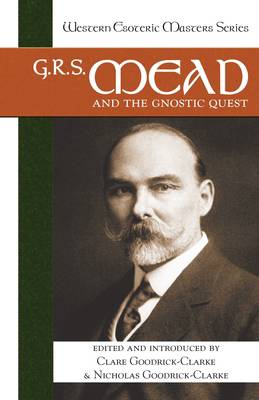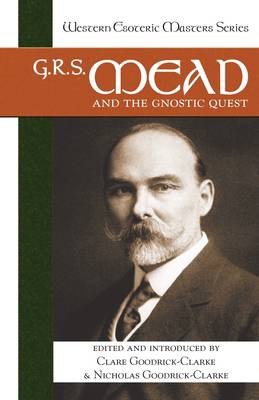
- Afhalen na 1 uur in een winkel met voorraad
- Gratis thuislevering in België vanaf € 30
- Ruim aanbod met 7 miljoen producten
- Afhalen na 1 uur in een winkel met voorraad
- Gratis thuislevering in België vanaf € 30
- Ruim aanbod met 7 miljoen producten
Zoeken
G. R. S. Mead and the Gnostic Quest
€ 22,45
+ 44 punten
Omschrijving
George Robert Stowe Mead (1863-1933) was a major translator, editor, and commentator on Gnostic and hermetic literature and thus a pivotal figure linking the late 19th-century esoteric revival to 20th-century art, literature, and psychology. As a young convert to the new movement of theosophy, he served as private secretary to its co-founder, Helena Petrovna Blavatsky, and after founding the European section of the Theosophical Society edited its London journal, Lucifer, for many years. Mead's initial interest in theosophy and Hinduism soon blossomed into a lifelong and wide-ranging engagement with the texts of Gnosticism, neo-Platonism, and hermeticism. His editions and commentaries on previously inaccessible sources became standard works before the First World War and an important source of inspiration to such figures as Jung, Ezra Pound, Yeats, and Robert Duncan. A new entry in the Western Masters Series of concise biographies noting key figures in the Western esoteric tradition, G.R.S. Mead and the Gnostic Quest introduces Mead's life, works, and influences, combining a substantial biography with a collection of his most important writings.
Specificaties
Betrokkenen
- Uitgeverij:
Inhoud
- Aantal bladzijden:
- 248
- Taal:
- Engels
- Reeks:
- Reeksnummer:
- nr. 8
Eigenschappen
- Productcode (EAN):
- 9781556435720
- Verschijningsdatum:
- 1/08/2005
- Uitvoering:
- Paperback
- Formaat:
- Trade paperback (VS)
- Afmetingen:
- 143 mm x 212 mm
- Gewicht:
- 322 g

Alleen bij Standaard Boekhandel
+ 44 punten op je klantenkaart van Standaard Boekhandel
Beoordelingen
We publiceren alleen reviews die voldoen aan de voorwaarden voor reviews. Bekijk onze voorwaarden voor reviews.






